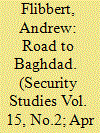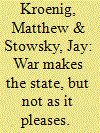|
|
|
Sort Order |
|
|
|
Items / Page
|
|
|
|
|
|
|
| Srl | Item |
| 1 |
ID:
076988


|
|
|
| 2 |
ID:
076991


|
|
|
|
|
| Publication |
2006.
|
| Summary/Abstract |
The shift to unipolarity has introduced new dilemmas for America's allies. Their level of strategic uncertainty has increased, largely because under unipolarity, allies' threat perceptions are more likely to diverge across time or issue areas and are not shaped as much by structural systemic factors. Although they want to maintain the pre-existing security arrangements as a means of managing the rising uncertainty, allies need to deal with the dual concern of either being trapped into the hegemonic partner's policies, or being abandoned by the hegemon. These two concerns - the alliance security dilemma - may become more or less prominent given the nature of the divergence in threat perceptions on different issues and at different times. To deal with this dual threat, allies employ two strategies: using the pre-existing alliance as a pact of restraint, and developing a division of labor with the hegemon. Both the dilemmas and the strategies used to mitigate them are examined here in the context of the European behavior within nato following the Gulf War, the nato involvement in Kosovo, the war in Afghanistan, and the war in Iraq.
|
|
|
|
|
|
|
|
|
|
|
|
|
|
|
|
| 3 |
ID:
076989


|
|
|
|
|
| Publication |
2006.
|
| Summary/Abstract |
Norms are fundamental constitutive elements of modern military power. Because norms influence military behavior and force structure, contemporary Western military power is produced only by interaction of normative and material factors. Two norms - the civilian casualty avoidance norm and Western societies' demand that their military forces take minimal casualties, or the force protection norm - more strongly influenced the origin, conduct, and outcome of nato's 1999 war against Yugoslavia than the material disparities of mismatched adversaries. Many actors, including the Yugoslav government and the Kosovo Liberation Army, notice the linkage of norms to Western military force structures and operational behavior and therefore strategically use norms instrumentally against states that adopt them. Such strategies generate technological and tactical responses, leading in turn to counter-responses - a dynamic interaction of material and normative factors that increasingly influence military operational outcomes
|
|
|
|
|
|
|
|
|
|
|
|
|
|
|
|
| 4 |
ID:
076992


|
|
|
|
|
| Publication |
2006.
|
| Summary/Abstract |
Why did the Bush administration take the United States to war with Iraq in the aftermath of September 11, 2001? The constructivist approach used in this article to answer this question argues that the ideas of a handful of policy intellectuals affected political outcomes in remarkably consequential ways. These ideas shaped administration assessments of every major aspect of the Iraq war, beginning with its necessity and justification. Although the administration's ideational commitments were complex and evolving, four sets of ideas were central to its risk-filled gambit in the Middle East: a belief in the necessity and benevolence of American hegemony, a Manichaean conception of politics, a conviction that regime type is the principal determinant of foreign policy, and great confidence in the efficacy of military force. Taken together, these ideas defined the social purpose of American power, framed threats to the United States, and determined appropriate solutions to core problems. Ideas are not the sole factors setting the course of u.s. foreign policy, but they are essential to explaining an otherwise puzzling administration decision
|
|
|
|
|
|
|
|
|
|
|
|
|
|
|
|
| 5 |
ID:
076990


|
|
|
|
|
| Publication |
2006.
|
| Summary/Abstract |
The shock of war is thought to be closely associated with the growth of the state, in the United States and elsewhere. Yet each proposal to significantly expand state power in the United States since September 11 has been resisted, restrained, or even rejected outright. This outcome - theoretically unexpected and contrary to conventional wisdom - is the result of enduring aspects of America's domestic political structure: the separation of powers at the federal level between three co-equal and overlapping branches, the relative ease with which interest groups access the policy-making process, and the intensity with which executive-branch bureaucracies guard their organizational turf. These persistent aspects of u.s. political life, designed by the nation's founders to impede the concentration of state power, have substantially shaped the means by which contemporary guardians of the American state pursue "homeland security." War does make the state, but not as it pleases. Theoretical approaches to state building should recognize that domestic political institutions mediate between the international shock of war and domestic state building
|
|
|
|
|
|
|
|
|
|
|
|
|
|
|
|
|
|
|
|
|